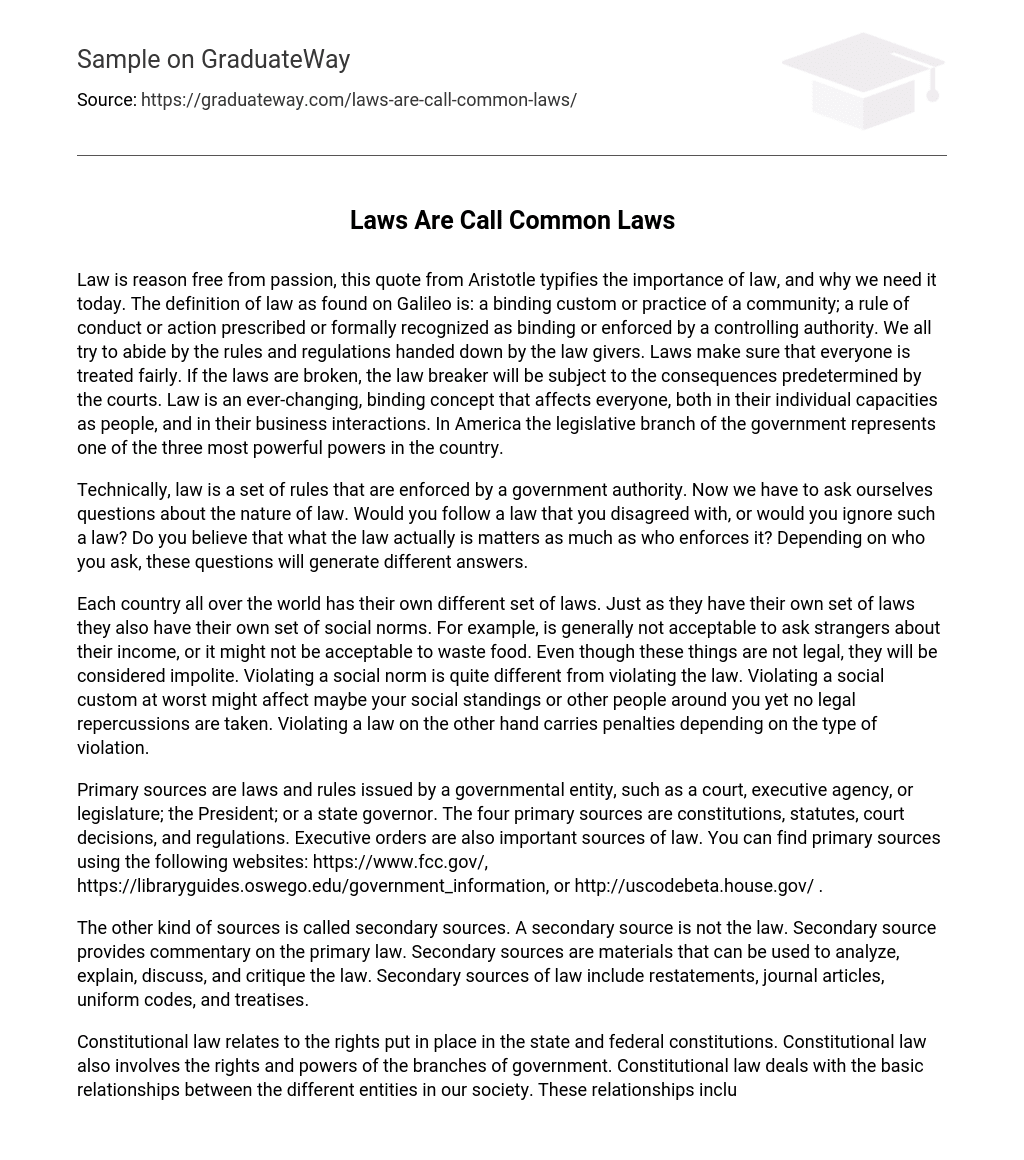Law is reason free from passion, this quote from Aristotle typifies the importance of law, and why we need it today. The definition of law as found on Galileo is: a binding custom or practice of a community; a rule of conduct or action prescribed or formally recognized as binding or enforced by a controlling authority. We all try to abide by the rules and regulations handed down by the law givers. Laws make sure that everyone is treated fairly. If the laws are broken, the law breaker will be subject to the consequences predetermined by the courts. Law is an ever-changing, binding concept that affects everyone, both in their individual capacities as people, and in their business interactions. In America the legislative branch of the government represents one of the three most powerful powers in the country.
Technically, law is a set of rules that are enforced by a government authority. Now we have to ask ourselves questions about the nature of law. Would you follow a law that you disagreed with, or would you ignore such a law? Do you believe that what the law actually is matters as much as who enforces it? Depending on who you ask, these questions will generate different answers.
Each country all over the world has their own different set of laws. Just as they have their own set of laws they also have their own set of social norms. For example, is generally not acceptable to ask strangers about their income, or it might not be acceptable to waste food. Even though these things are not legal, they will be considered impolite. Violating a social norm is quite different from violating the law. Violating a social custom at worst might affect maybe your social standings or other people around you yet no legal repercussions are taken. Violating a law on the other hand carries penalties depending on the type of violation.
Primary sources are laws and rules issued by a governmental entity, such as a court, executive agency, or legislature; the President; or a state governor. The four primary sources are constitutions, statutes, court decisions, and regulations. Executive orders are also important sources of law. You can find primary sources using the following websites: https://www.fcc.gov/, https://libraryguides.oswego.edu/government_information, or http://uscodebeta.house.gov/ .
The other kind of sources is called secondary sources. A secondary source is not the law. Secondary source provides commentary on the primary law. Secondary sources are materials that can be used to analyze, explain, discuss, and critique the law. Secondary sources of law include restatements, journal articles, uniform codes, and treatises.
Constitutional law relates to the rights put in place in the state and federal constitutions. Constitutional law also involves the rights and powers of the branches of government. Constitutional law deals with the basic relationships between the different entities in our society. These relationships include those between the states, foreign nations, and the three branches of the federal government.
Constitutional lawyers also help resolve disputes among the branches. They ensure that the laws passed by the legislature do not violate constitutional limits. The bulk of constitutional law has developed from past supreme court rulings. Constitutional law helps interpret the original Constitution.
Statutory law are written laws created by the legislative body. Congress is the legislative body at the federal level. An example of statutory law is violating a traffic law. Statutory laws vary from regulatory or administrative laws that are passed by executive agencies, and common law, or the law created by before court decisions.
Administrative agencies are created by the U.S congress and state legislatures. Administrative agencies often use delegated congressional authority to engage in specific issues in certain fields. Administrative agencies help manage crises and oversee complex government matters. The specialized laws made by administrative agencies are called ordinance or rules. Administrative agencies may be thought of as a delegation of congressional authority; where experts in particular fields engage in limited lawmaking, adjusting procedures, conduct investigations within their particular range.
Ever state has their own set of laws and these laws are call common laws. It’s a source of law that allows states to regulate. Common laws vary among different jurisdictions because regulations created by one jurisdiction are not binding in other jurisdictions. An example of common law is how certain areas may have special zoning regulations and restrictions on marriage and adoption.





